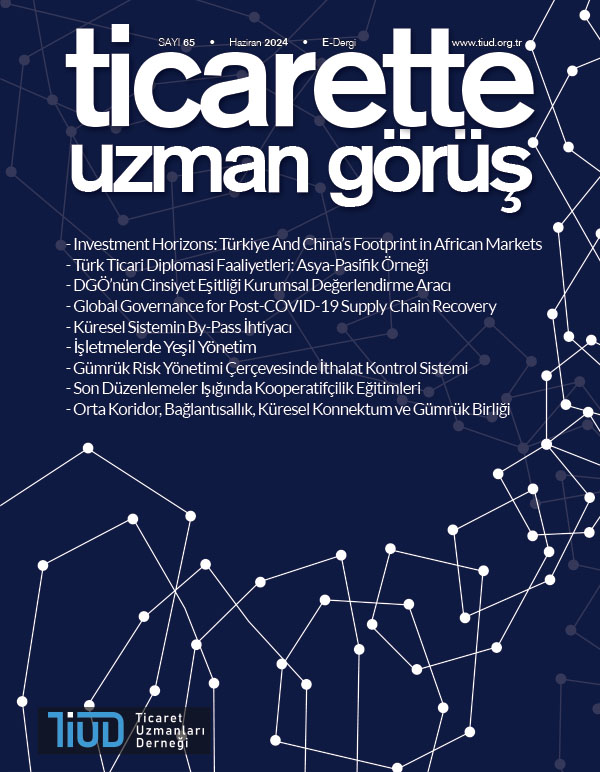-
Yeni Batı Mah. Palandöken Cad. No: 92 Yenimahalle/ANKARA
Investment Horizons: Türkiye And China’s Footprint in African Markets
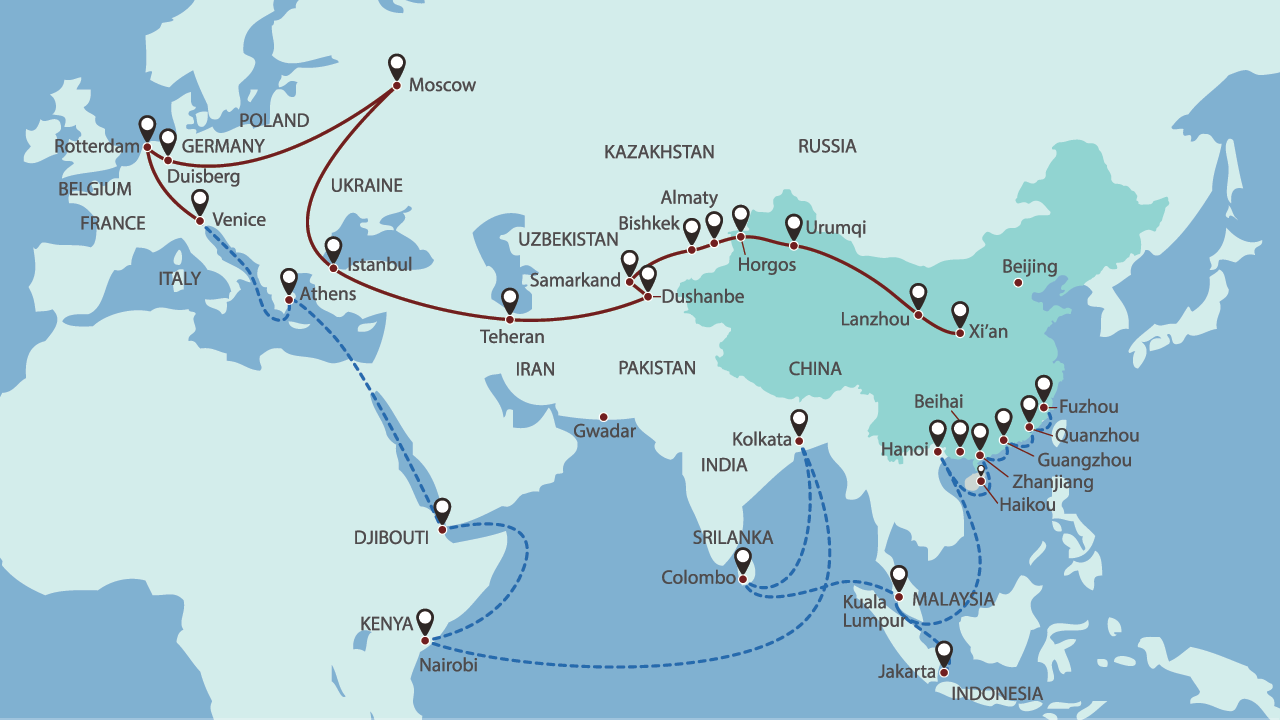
ABSTRACT
There is a famous Chinese proverb says that “To attract the phoenix, build the nest first.” Africa has big investment opportunities. At present, Türkiye and China are both partners in the Belt and Road Initiative, concurrently acting as competitors in the African investment landscape. China gradually has been a dominant player over whole Africa. In this respect, remaking world’s order has been shaped by soft power diplomacy tools. To invest in Africa effectively, it’s crucial to comprehend the dynamics of the Belt and Road Initiative within the continent. In this point, this article presents several insights to understand investment phenomena in Africa.
Keywords: Türkiye, China, Belt and Road Initiative, Foreign Investment
ÖZET
Ünlü bir Çin atasözü der ki, “Anka kuşunu çekmek için önce yuvayı yap.” Bilindiği üzere, Afrika’da büyük yatırım fırsatları bulunmaktadır. Kuşak ve Yol Girişimi ortağı olan Türkiye, Afrika’daki yatırım pazarında Çin ile rekabet etmektedir. Çin, günden güne Afrika kıtası üzerinde hakim bir oyuncu rolünü sağlamlaştırmaktadır. Bu bağlamda, dünya düzeninin yeniden şekillendirilmesi, yumuşak güç diplomasisi araçlarıyla biçimlendirilmektedir. Afrika kıtasına etkili bir şekilde yatırım yapmak için, bu coğrafyada konumlanan en büyük yatırım platformu Kuşak ve Yol Girişimi’nin dinamiklerini anlamak hayati önem taşımaktadır. Bu makale, Afrika’daki yatırım dinamiklerini anlamak için bir takım analizler sunmaktadır.
Anahtar Kelimeler: Türkiye, Çin, Kuşak ve Yol Girişimi, Yabancı Yatırım
INTRODUCTION
In recent years, both China and Türkiye have significantly intensified their economic activities in Africa, reflecting a growing interest in the continent’s vast potential for economic growth and development. China’s Belt and Road Initiative (BRI) has emerged as a cornerstone of its strategy to enhance regional connectivity and expand its economic influence globally, while Türkiye has pursued a multifaceted approach to strengthen its economic ties with African countries.
BRI, launched by China in 2013, aims to connect Asia with Africa and Europe through ambitious infrastructure projects spanning both land and maritime routes. With a focus on enhancing regional integration, boosting trade, and stimulating economic growth, the BRI has garnered significant attention and investment in Africa. Meanwhile, Türkiye has also recognized the economic opportunities presented by Africa, leading to the adoption of various initiatives such as the Africa Opening Action Plan and Africa Business Economic Forums.
CHINA’S BELT AND ROAD INITIATIVE: ECONOMIC ACTIVITIES IN AFRICA
China’s Belt and Road Initiative (BRI), also known as “一带一路” in Chinese, is a strategy initiated by the People’s Republic of China with the goal of connecting Asia with Africa and Europe through both land and maritime networks. This initiative aims to enhance regional integration, boost trade, and stimulate economic growth. Coined by China’s President Xi Jinping in 2013, the name draws inspiration from the ancient Silk Road established during the Han Dynasty, which connected China to the Mediterranean via Eurasia over 2,000 years ago. BRI consists of two main components:
The Silk Road Economic Belt, a trans-continental passage connecting China with Southeast Asia, South Asia, Central Asia, Russia, and Europe via land routes. The 21st Century Maritime Silk Road, a sea route linking China’s coastal regions with Southeast Asia, South Asia, the South Pacific, the Middle East, Eastern Africa, and Europe.
The BRI prioritizes policy coordination, infrastructure connectivity, unimpeded trade, financial integration, and connecting people. It encourages cooperation among participating countries to facilitate implementation and aims to promote cultural exchanges to foster understanding and collaboration (EBRD, 2013).
BRI holds significant importance for Africa as it offers opportunities for infrastructure development, trade expansion, and economic growth, fostering greater connectivity between African nations and global markets.
On October 10, 2023, China marked the 10th anniversary of the launch of its ambitious BRI with the unveiling of a White paper on the BRI. This document, titled “The Belt and Road Initiative: A Key Pillar of the Global Community of Shared Future,” represents a comprehensive review and reaffirmation of the BRI’s global role and impact since its conception and launch in 2013.
The BRI White Paper outlines a significant connection between the BRI and regional and global development initiatives. Specifically, the BRI aligns with plans such as the African Union’s (AU) Agenda 2063 and the United Nations 2030 Agenda for Sustainable Development. This alignment implies that the implementation of the BRI complements the development objectives of Africa, which has emerged as a significant participant in the BRI, with a remarkable 53 African countries and the AU entering into cooperative agreements with China (Belt and Road Portal, 2023).
Figure 1: Chinese Projects and Finance of Projects in Africa
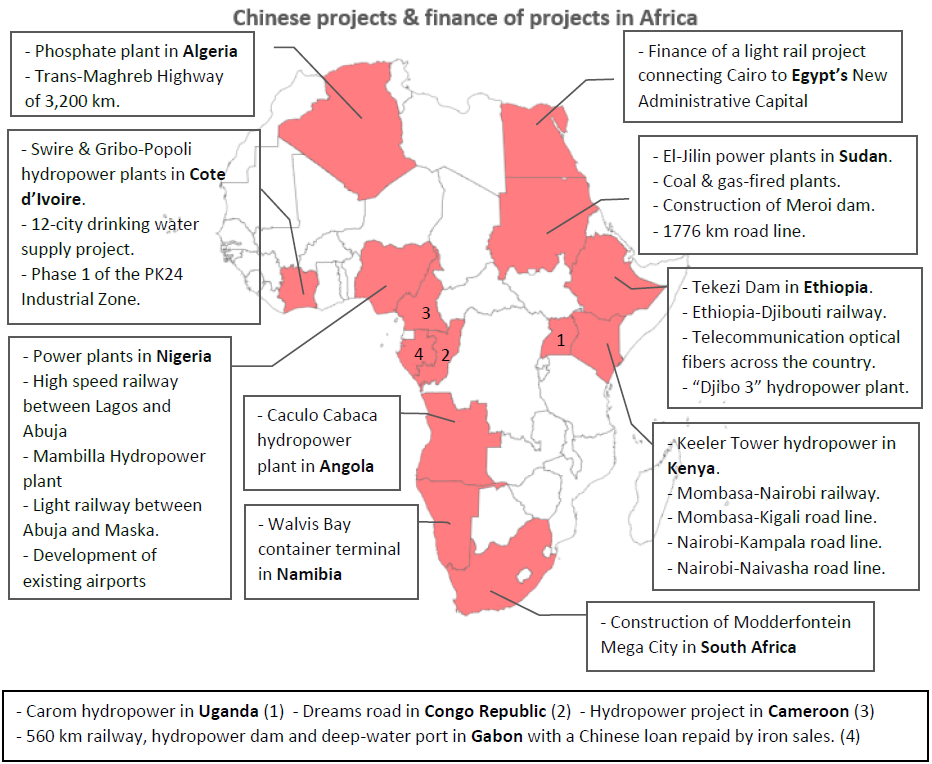
The tangible benefits of the BRI to Africa’s vision are already evident. Over the past decade, Chinese enterprises have substantially contributed to newly contracted projects. These ventures have garnered immense value, surpassing the impressive benchmark of 700 billion USD. These contributions encompass the construction of an extensive network of over 12,000 kilometers of railways and roads, the expansion of nearly 20 ports, and the establishment of more than 80 substantial power facilities throughout the continent. Notable examples of these projects include the Mombasa-Nairobi Railway in Kenya, the Addis Ababa-Djibouti Railway in Ethiopia, the Port of Doraleh in Djibouti, the Maputo-Katembe Bridge in Mozambique, the Lagos-Kano Railway in Nigeria, the Entebbe-Kampala Expressway in Uganda, the Cherchell Ring Expressway and Port in Algeria, among others (Jinping, 2020).
Figure 2: Outward FDI Flow of China to Africa
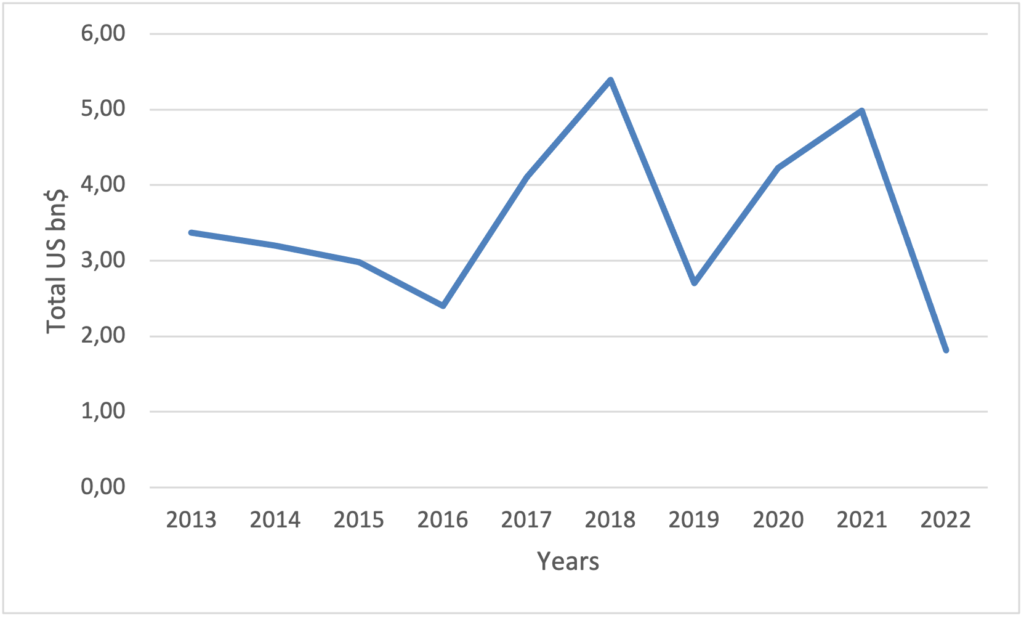
Flows surged from US$3.2 billion in 2013 to US$5.4 billion in 2021, then dropped to US$1.8 billion in 2022. The top five African destinations for Chinese FDI in 2022 were South Africa, Niger, the Democratic Republic of Congo, Egypt, and Cote d’Ivoire. Chinese companies have growing confidence in the African market. More than 3,000 Chinese enterprises have invested deeply in Africa, of which over 70 percent are private companies (Global Times, 2023).
Chinese loans have provided African countries with the necessary funding to build infrastructure and foster economic growth, mainly through trade, filling up a financing gap western countries have not been willing to deal with. Chinese loans have been used primarily to develop Africa’s poor infrastructure: about 40% has been utilized for power generation and transmission and 30% for upgrading outdated transport facilities (Chen, 2018).
TÜRKIYE’S ECONOMIC ACTIVITIES IN AFRICA
The African continent, abundant in valuable minerals, as well as natural gas and oil, has emerged as a fiercely contested arena for nations like China, Russia, India, and Japan, as well as its longstanding partners with established operations. In recent years, Türkiye has taken notice of the African continent, which has experienced substantial economic growth in several countries.
As a reflection of Türkiye’s multidimensional policy pursuits, the “Africa Opening Action Plan” was adopted in 1998, marking the first step towards developing a foreign policy vision towards Africa. This plan aimed to enhance relations with the African continent, particularly Sub-Saharan African countries, in economic, political, and cultural spheres (Orakçı, 2018).
The year 2005 was a critical milestone in Türkiye-Africa relations. That year, Türkiye declared it as “The Year of Africa” and the Turkish Cooperation and Coordination Agency (TİKA) opened its first office on the continent in Ethiopia. Equally significant was Türkiye being granted observer status in the African Union, the most important international organization established by African countries, starting from 2005. Additionally, Türkiye’s embassy in Addis Ababa was accredited to the African Union (Hazar, 2014).
The most significant development in terms of relations in 2008 was the First Türkiye-Africa Cooperation Summit, held with the participation of forty-nine African countries and eleven representatives from international and regional organizations, including the African Union. The summit took place in Istanbul from August 18th to 21st, 2008. During the summit, the “Türkiye-Africa Cooperation Istanbul Declaration: Cooperation and Solidarity for a Common Future” document was adopted, aiming to enhance cooperation in various fields.
Following the decisions taken during the II Türkiye-Africa Partnership Summit held in Malabo, Equatorial Guinea, in November 2014, Türkiye-Africa Business and Economy Forum has been periodically organized since 2016. Building upon the outcomes of the previous successful forums, recently IV Türkiye-Africa Business and Economy Forum took place on October 12-13, 2023, in Istanbul.
Figure 3: Turkish Projects in Africa
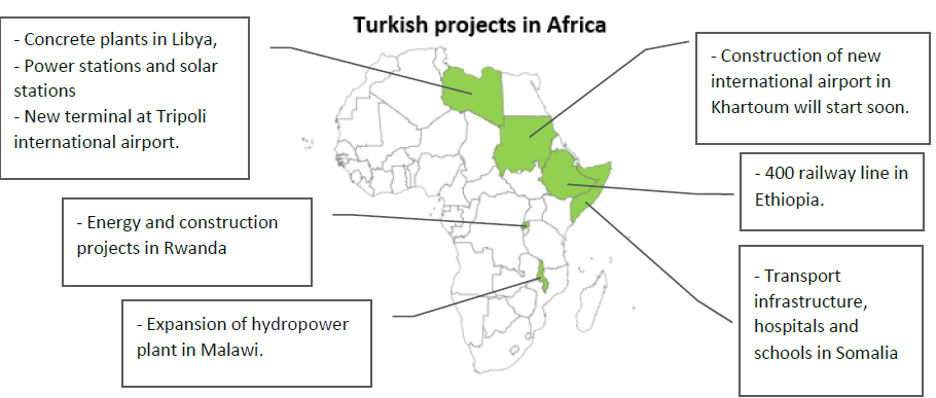
Turkish companies have become increasingly present across Africa. One of the most concrete indicators of our strengthening relations is our developing economic ties and rapidly increasing trade figures. Türkiye’s total trade volume with the African Continent has increased from 5,4 billion $ in 2003 to 34,5 billion $ in 2021 (MFA, 2024).
Türkiye’s Foreign Economic Relations Board (DEIK) runs 45 business councils in African countries in order to promote bilateral trade and mutual investment. Turkish private companies are also monitoring Africa for investment and business opportunities. For example, Turkish Airlines (THY) flies to 60 different destinations in 40 African countries across the continent, whereas it only had 5 African flight destinations in 2005. While Türkiye increases its investments steadily on the whole continent, the great amount of the overall investment is in northern African countries, namely Algeria, Egypt, Tunisia, and Morocco (Aksoy et al, 2022).
Figure 4: Outward FDI Flow of Türkiye in Africa
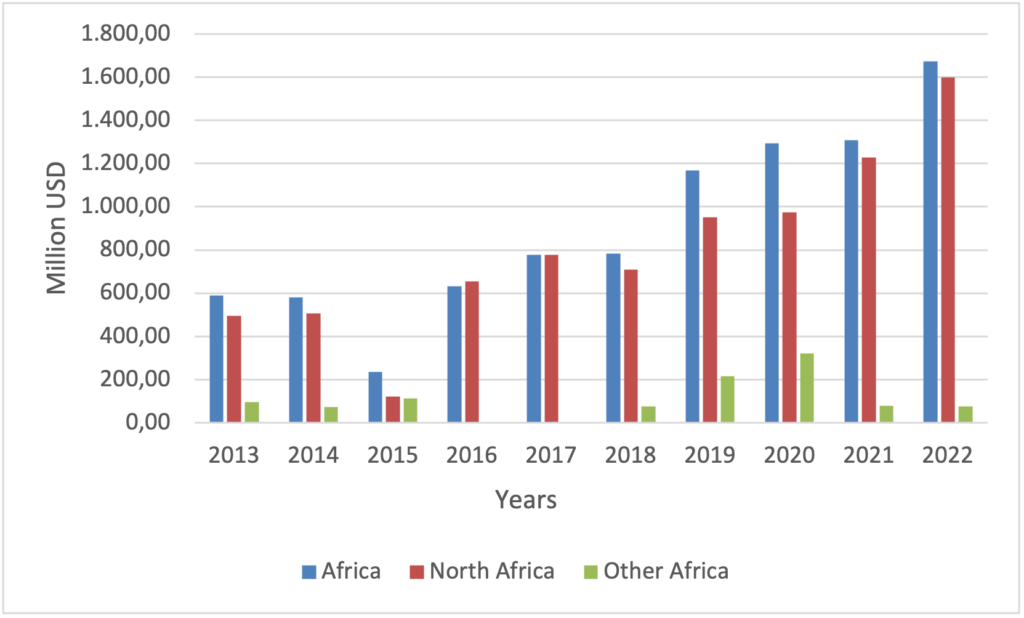
According to the data from the Central Bank of the Republic of Türkiye, a significant portion of Türkiye’s investments in Africa is concentrated in North Africa, with a notable presence in Algeria. While Türkiye may not rank among the top players in terms of investments made in Africa compared to other actors on the continent, its investments have been remarkably successful in terms of job creation potential. According to the FDI Intelligence report in 2014, while China, which ranked highest in investment on the continent, created employment for 10,811 people, and India’s investments generated employment for 6,193 people, Türkiye ranked first by providing employment for 16,593 people through its investments (Tepeciklioğlu, 2017).
CONCLUSION
Instead of resorting to the conventional conclusion where the introductory points are reiterated using refined language, an alternative approach could involve conducting a brief SWOT analysis of Türkiye’s Economic Activities in Africa.
Strengths:
Strategic Location: Türkiye’s geographic location provides a gateway for African countries to access European and Asian markets, facilitating trade and investment opportunities.
Soft Power and Diplomacy: Türkiye’s Business Forum, Türkiye’s humanitarian aid, development assistance, and educational initiatives in Africa enhance its soft power and diplomatic relations with African nations.
Weaknesses:
Competition with Global Players: Turkish companies face competition from other global players, including China, Europe, and the United States, in securing contracts and investment opportunities in Africa.
Political Instability: Political instability in certain African countries may pose risks to Turkish investments and project implementation, affecting business operations and profitability.
Opportunities:
Market Potential: Africa offers vast market potential for Turkish goods and services, with a growing middle class and increasing consumer demand across various sectors.
Investment Partnerships: Collaboration with African governments, international organizations, and other stakeholders can create opportunities for joint investments and projects in key sectors such as infrastructure, energy, and agriculture.
Threatens:
Belt and Road Initiative: China, as a dominant player in Africa, is difficult to compete in terms of BRI investments in Africa.
Other Potential Initiatives: The introduction of the Build Back Better World (B3W) initiative by the US could restrict investment opportunities for Türkiye in the future.
REFERENCES
1- African Cooperation Sector Report, (2022). Central Bank of Egypt.
2- Aksoy, H.A, Çevik, S, Schneider and M, Ketner, D. (2022). “Visualizing Türkiye’s Activism in Africa”. https://www.cats-network.eu/topics/visualizing-Türkiyes-activism-in-africa#c8234. Accessed: 13/04/2024
3-Belt and Road Portal, (2023). https://eng.yidaiyilu.gov.cn/. Accessed: 01/04/2024
4-Chen, X. (2018). “Why fears of China’s neocolonialism in Africa ring false in the face of numbers that tell a different tale”. https://www.scmp.com/comment/insight-opinion/united-states/article/2165489/why-fears-chinas-neocolonialism-africa-ring. Accessed 10/04/2024.
5-European Bank for Reconstruction and Development (EBRD), (2013). https://www.ebrd.com/what-we-do/belt-and-road/overview.html. Accessed: 11/04/2024
6-Global Times, (2023). “China’s win-win investment in Africa set to rise despite Western slander” https://www.globaltimes.cn/page/202308/1296557.shtml. Accessed: 07/04/2024
7-Hazar, N. (2014). “Türkiye Afrika’da: Eylem Planının Uygulanması ve Değerlendirme On Beş Yıl Sonra”, Ortadoğu Analiz Dergisi, 4/46.
8-Jinping, X, 2020. “Xi Jinping: The Governance of China Volume Three”. Foreign Languages Press.
9-Orakçı, S. (2018). “Türkiye-Afrika İlişkileri: Tarihî Süreç, Yaklaşımlar ve Beklentiler”, İNSAMER.
10-Tepeciklioğlu, E. (2017). “Economic Relations Between Türkiye and Africa: Challenges and Prospects”.
11-http://english.mofcom.gov.cn/ Accessed: 11/04/2024
12-https://www.mfa.gov.tr/turkiye-africa-relations.en.mfa Accessed: 11/04/2024
13-https://www.tcmb.gov.tr/ Accessed: 11/04/2024
Yazar Hakkında
Çankaya Üniversitesi Siyaset Bilimi ve Uluslararası İlişkiler Bölümü’nden 2012 yılında mezun olmuştur. Lisans öğrenimi esnasında ayrıca Mütercim ve Tercümanlık (İngilizce) alanında yan dal programını tamamlamıştır. Bakanlıktaki çalışma hayatına 2014 yılında uzman yardımcısı olarak başlamıştır. Yine aynı üniversitede İnsan Kaynakları Yönetimi alanında tezli yüksek lisansını tamamlamış olup akabinde Anadolu Üniversitesi Maliye bölümünde doktora çalışmalarını sürdürmüştür. 2022 yılında İspanya’nın Jaen şehrinde Zeytinyağı alanında uzmanlık eğitimi almıştır. Bakanlıkta Uluslararası Zeytin Konseyi iş ve işlemleri alanında çalışmaktadır. 2023 yılında Çin Halk Cumhuriyeti Ticaret Bakanlığı’nın bursunu kazanarak gittiği Pekin Normal Üniversitesi Kuşak ve Yol Enstitüsü’nde tezli MBA programına devam etmektedir. Kuşak ve Yol Girişiminin kurucularından eğitim alan yazar bu alanda uzmanlaşmış olup iyi düzey İngilizce ve İspanyolca ile temel düzeyde Çince (Mandarin) bilmektedir.
İçindekiler

Yönetim Kurulundan

Yayın Kurulundan
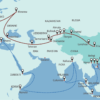
Investment Horizons: Türkiye And China’s Footprint in African Markets

Aktörler, Kurumlar ve Stratejiler Bağlamında Türk Ticari Diplomasi Faaliyetleri: Asya-Pasifik Bölgesi Örneği

Dünya Gümrük Örgütü’nün Cinsiyet Eşitliği Kurumsal Değerlendirme Aracı Üzerine Bir İnceleme

How Can Global Governance Foster Collaboration to Repair And Strengthen Supply Chains in the Post-COVID-19 Era?

Küresel Sistemin By-Pass İhtiyacı

İşletmelerde Yeşil Yönetim

Gümrük Risk Yönetimi (CRMS) Çerçevesinde İthalat Kontrol Sistemi (ICS)

Son Düzenlemeler Işığında Kooperatifçilik Eğitimleri

Orta Koridor, Bağlantısallık, Dönüşen Küresel Konnektum ve Gümrük Birliği’nin Modernizasyonu
Ticaret Uzmanları Derneği (TİUD), Ticaret Uzmanları ile Uzman Yardımcılarının dayanışma ve birlikteliğini geliştirmeyi, ortak hak ve menfaatlerini korumayı, mesleki, sosyal ve kültürel gelişimlerine katkıda bulunmayı amaçlayan bir sivil toplum kuruluşudur.



